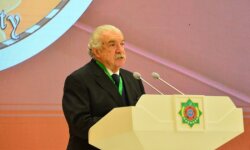The expert emphasises that Central Asia has remained a region of confrontations among the great powers.
 The coming to power in Kyrgyzstan of President Sadyr Japarov led experts to bring up the subject of Kyrgyzstan’s foreign policy. The point is that he won the presidential election that had come after the revolution. In other words, the ex-prisoner was something like a ‘dark horse’ in predicting future policy orientations.
The coming to power in Kyrgyzstan of President Sadyr Japarov led experts to bring up the subject of Kyrgyzstan’s foreign policy. The point is that he won the presidential election that had come after the revolution. In other words, the ex-prisoner was something like a ‘dark horse’ in predicting future policy orientations.
The official entry of Japarov into power coincided with Joe Biden’s victory in the United States. According to a number of political analysts, Central Asia may once again become one of the key plans in Washington’s foreign policy. In the past few years, the position of the United States has weakened in the region.
In an interview with CentralAsia.news, an expert Mederbek Korganbaev shared his vision of the policy of the United States, Russia and China in Central Asia. He believes that the rapprochement with the Russian Federation most strongly meets the interests of Bishkek in the context of the “Great Game” in the region.
Three factors
When crafting a foreign policy, official Bishkek must take into account three crucial factors: geography, history and economy. All these sciences merge into one whole – geopolitics, explained the interlocutor.
“Knowledge of geopolitics will empower Kyrgyzstan’s leadership to make the best decisions and conduct an effective foreign policy with no losses and harm to the national interests. Now, after three revolutions in 2005, 2010 and 2020, Kyrgyzstan more than ever needs to shape a foreign policy vector that addresses adequately current demands and challenges. When forming the aforementioned ‘useful’ foreign policy, the authorities of the Republic should focus on three areas,” the political scientist says.
The expert supports maintaining social and political stability throughout the Republic. He sees the second aspect in adopting measures to improve the social and economic sectors. The third aspect is to uphold the national interests of Kyrgyzstan in its relations with the great powers, regional players and neighbours and fulfil the obligations to its strategic partners.
Interesting Kyrgyzstan
Mederbek Korganbaev believes that due to its geographical location Kyrgyzstan is of geopolitical interest for three great powers – Russia, China and the United States. For Moscow, Bishkek is the second bulwark of collective security after Tajikistan. With this in mind, the Kremlin has a strong interest in strengthening security and defence capabilities of Kyrgyzstan, the expert says.
“China views the territory of the Republic as a transit zone for transporting its goods and conducting economic activities. Like Russia, Beijing badly needs official Bishkek to ensure political stability in the country,” Korganbaev says.
The Americans view Kyrgyzstan as the weakest link on the political and economic fronts among the Central Asian republics and as a springboard in achieving their goals. The statements of US President Joe Biden make it clear than the new American leader aims the foreign policy at stirring up confrontations among Washington, Moscow and Beijing.
“Consequently, the United States will take all measures to exert pressure or negatively impact the interests of Russia and China, including in Central Asia,” the interlocutor predicted.
Facing such a situation, Moscow and Beijing are forced to consolidate, “match their clocks” and coordinate further actions as to undercut the geopolitical ambitions of the United States. It was not by chance that the US President declared, “America is back” in his speech in early February 2021. The expert believes this may mean that the US will make efforts to restore their positions in the region of Russia’s and China’s influence – Central Asia.
Participants and principles of the “Great Game”
The political scientist notes that the “Great Game” – the geopolitical rivalry between the British and Russian Empires over the spheres of influence in Central Asia, which began in the 19th century, continued and was gaining momentum. However, the United States and China have replaced Britain, and Kyrgyzstan has been involved in confrontations.
“The only goal Russia pursued in the “Great Game” was to strengthen its southern borders and contain British expansion in Central Asia. History is repeating itself now; Russia is strengthening defence capabilities of Tajikistan and Kyrgyzstan (the first and second echelons of collective security). This is being done to prevent terrorists in Afghanistan, which have been created by the US special services as a lever of pressure in the region, from invading,” the expert notes.
The third echelon of collective security is Kazakhstan, the interlocutor says. Korganbaev is convinced that Russia would rather cut off the fighters in Tajikistan and Kyrgyzstan than bring reinforcements to help the Kazakhs. The steppes of Kazakhstan are much more difficult to fight on. The Russian lands are a chip shot away from Kazakhstan.
The expert says Tajikistan and Kyrgyzstan have natural barriers, such as mountains with narrow passages, which are passable at certain times of the year and controlled by border services. Consequently, the Kremlin prefers defeating terrorists in mountainous areas or on the borders of Dushanbe and Bishkek. It is precisely for these purposes that Russia has the military bases in Tajikistan and Kyrgyzstan, the political scientist says.
With this in mind, Bishkek needs to enhance and strengthen strategic partnerships with Russia in terms of security and economy. The Americans can offer Kyrgyzstan investments, loans and grants and military and technical assistance. In return, Washington will require the Republic to limit its cooperation with China and Russia. In geopolitical terms, this is impossible and dangerous as far as Bishkek’s interests are concerned, Korganbaev says in conclusion.



